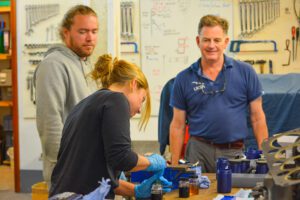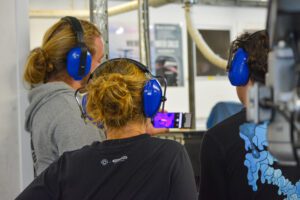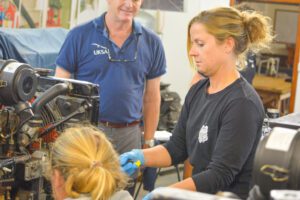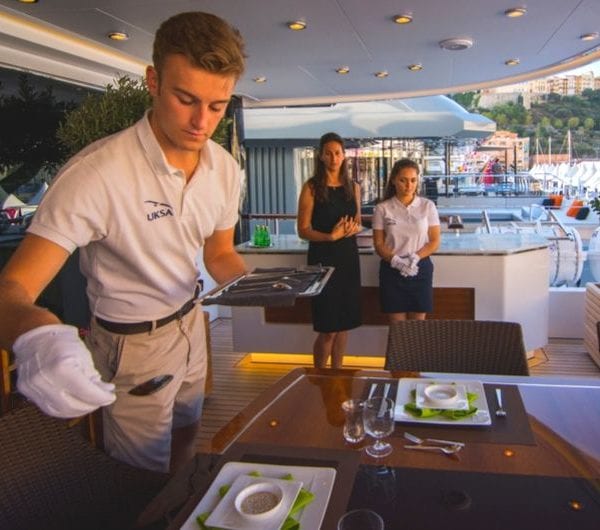Engineering Crew Training Course
Start your superyacht engineering career on Small Vessels or on Superyachts
Engineering has the largest skills shortage gap in the maritime industry and UKSA’s Engineering Crew Training course is the perfect pathway for experienced and new crew who want to work on small vessels or enter the superyacht industry via an engineering route. Although this training course is suitable for new members of crew some hands on experience in specific engineering employment is desirable as is a high level of professionalism and maturity.
Thanks to our expert tuition, purpose-built site and ALL-INCLUSIVE, intensive training package, you can start your career in the superyacht industry after five weeks at UKSA, armed with all the qualifications and skills you need.
Our yachting career students will tell you that we provide unbeatable course content, training and facilities. You will also enjoy modern shorebased accommodation and freshly prepared daily meals while you are training with us.

![]()
About the Superyacht Engineer course
The aim of this course is to familiarise you with common workshop practices and repair methods. We teach you the tools to use and the safe methods and procedures to use these tools and repair equipment.
At the end of this course you will have the basic knowledge of how to carry out repairs and be confident in procedures ensuring correct methods have been employed.
This course will suit engineer officers looking to pursue a career on “Small Vessels” and is also a good pathway for new crew looking to enter the superyacht industry via an engineering route. Skills gained through this course will be transferable between the following industries:
- Superyachts
- Tugs
- Workboats
- Standby
- Seismic survey
- Oceanographic research vessels
- Government patrol vessels
- Fishing vessels
Course content focuses on the following areas:
- Crew training (deck work, look out and watch duties, tender duties and safety procedures)
- Vessel care (maintenance, basic repairs, cleaning)
- STCW training
- Mental Health training
- MCA Engineering training
- MCA Skills Workshops (70 hours)
- Careers guidance from our professional team
- Networking within the industry
- UKSA superyacht uniform (branded polo shirts) are provided
Why train with UKSA?
When you train at UKSA you experience our world-class tuition and over 35 years of maritime industry insight. Also included in your course fee :
- Accommodation in our new Sea.Change building for the duration of your course *
- Freshly prepared breakfast, lunch and dinner provided each day
- Purpose built classrooms and navigational training simulators all on one site
- One-to-one mentoring throughout the course from your instructors
- Dedicated careers course manager
- Career support both during and after your time at UKSA
- Networking on site throughout your time at UKSA
- Use of our swimming pool
- Access to our fully equipped gym
* subject to availability, we reserve the right to provide alternative accommodation on site
‘UKSA plays a significant role in training the next generation of yacht crew. The introduction of the new Engineering Crew Training Program provides an all-inclusive pathway to becoming a Small Vessel Engineering Officer. This course not only equips aspiring new engineers with the necessary skills to embark on successful careers in yachting, but also prepares individuals for the demands of the industry.
The collaboration between Edmiston and UKSA signifies a commitment to nurturing talent and fostering excellence within the maritime sector. As advocates for professional development, we are dedicated to supporting UKSA and the next generation of engineering graduates, paving the way for a brighter future in yacht engineering and maritime operations.’ Shelley Dowie, Head of Yacht Operations, Edmiston
Qualifications gained
- UKSA Superyacht Crew Training Certificate
- MCA AEC1
- MCA AEC2 (course participation is dependent upon successful completion of AEC1)
- MCA Workshop Skills Training (participation dependent upon successful completion of AEC1 and AEC2)
- STCW Basic Safety Training
- MCA Proficiency in Designated Security Duties
- Mental Health for Seafarers
- RYA Powerboat Level 2
- RYA Marine Short Range Radio
Alternative pathways into the superyacht industry
If you are considering a long term career on-board a superyacht and are aged between 18-25 you may want to consider our Superyacht Cadetship.
Prerequisites
Marine Engineers must be physically fit and able. You must be energetic and enthusiastic with an ability to work to a high standard in all tasks. Elevating skills from AEC1 to AEC2 is a considerable jump so some previous knowledge and experience using and maintaining engines is desirable.
All seafarers must have an ENG1 seafarer medical fitness certificate to work at sea.
Whilst it’s not essential to hold your ENG1 to complete your training with UKSA, it is required to hold this to secure work in the industry. For this reason, we recommend all students gain their ENG1 before they attend training.
Course funding information
As a charity, we have funding opportunities available for many of our students. UKSA is committed to making training and qualifications accessible to those who have the desire to succeed in a yachting or watersports career. Your course adviser will be able to provide you with the details, assess your eligibility and put you forward if you are a suitable candidate.
To see a full list of all of our funding options visit our funding opportunities page or call us to talk about your options on +44 (0)1983 203038
Engineering Crew Training Course FAQs
How much do engineers on superyachts make?
Superyacht engineers can make a range of wages based on experience, education, location, and vessel size. Senior engineers often earn between £2,500 and £4,500 per month, in larger yachts this could rise to £3,500 to £5,500 per month.
How many engineers does a superyacht have?
A superyacht’s engineering staff might vary in number based on the size and complexity of the ship. Depending on the size and operating needs of the vessel, a superyacht will often have one or more assistant engineers in addition to the chief engineer.
What is a 2nd engineer on a yacht?
A yacht’s second engineer helps the chief engineer in supervising the mechanical and electrical systems of the vessel throughout their operation, maintenance, and repair. They are usually the second-in-command in the engineering department. They might assume leadership duties in the chief engineer’s absence because they frequently have a great deal of expertise.
How much do junior engineers make on yachts?
Junior engineers on yachts often make between £1,500 and £2,500 per month, depending on experience, education, and the size of the vessel. Even though entry-level jobs may pay less, they offer worthwhile experience and chances for professional growth.
What qualifications do I need to be a yacht engineer?
Typically, being a yacht engineer requires a combination of necessary training, qualifications, and real-world experience. It is helpful to have a degree or certificate in mechanical engineering, marine engineering, or a similar field in addition to credentials like the Engineer Officer Certificate of Competency and STCW Basic Safety Training.
What qualifications do I need to be an engineer on a superyacht?
Superyacht engineers need to have a solid foundation in marine engineering or a similar discipline, as well as the necessary certifications and real-world experience. This may involve qualifications like STCW endorsements, Y4/Y3 Engineer Officer Certificate of Competency, and specialised training in areas like electrical systems, refrigeration, and propulsion, depending on the jurisdiction and the size of the boat.
Dates and pricing
| Course | From | To | All-inc |
|---|---|---|---|
| Engineering Crew Training | 13/10/2024 | 15/11/2024 | £6,000 |
Don’t just take our word for it
![]()
![]()
Ezekiel Denny – UKSA Superyacht Deckhand Training Graduate
“I received assisted career funding from Edmiston which enabled me to embark on this new adventure. Without the financial assistance from Edmiston I would probably not have been able to follow my dreams. If you are looking for a challenge that is extremely rewarding with lots of new experiences I would highly recommend you do a Superyacht Training course with UKSA.”






